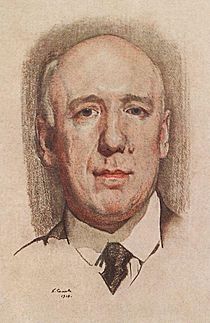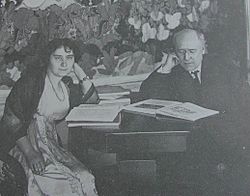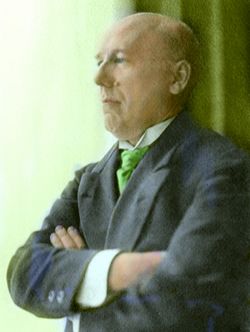Fyodor Sologub facts for kids
Quick facts for kids
Fyodor Sologub
|
|
|---|---|

Sologub in 1910
|
|
| Born | Fyodor Kuzmich Teternikov 1 March [O.S. 17 February] 1863 Saint Petersburg, Russian Empire |
| Died | 5 December 1927 (aged 64) Leningrad |
| Occupation | Poet, novelist, short story writer, playwright, essayist |
| Literary movement | Russian Symbolism |
| Notable work | The Petty Demon |
Fyodor Sologub (Russian: Фёдор Сологу́б, born Fyodor Kuzmich Teternikov, Russian: Фёдор Кузьми́ч Тете́рников, also known as Theodor Sologub; 1 March [O.S. 17 February] 1863 – 5 December 1927) was an important Russian writer. He was a Symbolist poet, novelist, translator, playwright, and essayist. Symbolism was a movement where artists used symbols and ideas to express deeper meanings. Sologub was one of the first Russian writers to include sad and thoughtful ideas, common in European literature around the end of the 1800s, into his stories.
Contents
Early Life and Education
Sologub was born in St. Petersburg, Russia, in 1863. His father was a poor tailor who had once been a serf. A serf was like a servant who was tied to the land and belonged to a landowner. When Fyodor was only four years old, his father passed away. His mother, Tatiana, then had to work as a servant for a wealthy family.
Fyodor and his younger sister, Olga, grew up in this aristocratic home. The family helped Fyodor get a good education. He was a very good student at the St. Petersburg Teachers' Institute. After graduating in 1882, he became a teacher. He took his mother and sister with him to his first teaching job in Kresttsy. There, he started his writing journey. His first poem, "The Fox and the Hedgehog," was published in a children's magazine in 1884. He used the name Te-rnikov for this work.
Sologub continued to write as he moved to new teaching jobs. He worked in Velikiye Luki in 1885 and Vytegra in 1889. He felt far away from the main literary world in the big cities. However, his ten years living in these smaller towns gave him many ideas for his famous novel, The Petty Demon. He later said that he even made the events in the novel seem less harsh than what really happened.
Starting His Literary Career
In 1892, Sologub finally moved back to Saint Petersburg. He got a job teaching mathematics. He also started writing what would become his most famous novel, The Petty Demon. He began visiting the offices of a magazine called Severny Vestnik (Northern Herald). This magazine published many of his writings over the next five years.
In 1893, a writer named Nikolai Minsky suggested he use a pen name. They chose "Sollogub," but dropped one "l" to avoid confusion with another writer, Count Vladimir Sollogub. In 1894, his first short story, "Ninochka's Mistake," was published. Later that year, his mother passed away.
In 1896, Sologub published his first three books. These included a book of poems, a collection of short stories, and his first novel, Tyazhelye sny (Bad Dreams). He had started writing Bad Dreams in 1883. It is seen as one of the first "decadent" Russian novels, meaning it explored themes of decay and decline.
After 1897, he started writing for a different magazine called Sever (North). The next year, his first collection of fairy tales was published. In 1899, he became the principal of a school and a member of the St. Petersburg District School Council. He kept publishing poetry books. In 1902, he finished The Petty Demon. This novel was published in parts starting in 1905. At this time, Sologub hosted literary gatherings at his home. Many famous poets, artists, and actors, like Alexander Blok and Mikhail Kuzmin, came to these "Sundays."
Growing Fame and Marriage
During the 1905 Revolution, Sologub's short, politically themed tales, called skazochki ("little tales"), became very popular. They were collected into a book called Politicheskie skazochki (Political Tales) in 1906. His novel The Petty Demon was published as a full book in 1907. It quickly became very popular and was printed ten times during his lifetime.
Sologub's next major work was a trilogy called A Created Legend (1905–1913). This series included Drops of Blood, Queen Ortruda, and Smoke and Ash. These stories were similar to his earlier works but showed a more positive view of the world. The first book famously states that even though life can be "stagnant in darkness, dull and ordinary," the poet can "create from it a sweet legend."
His growing success was mixed with sadness. His sister Olga had tuberculosis. In 1906, he traveled with her for treatment. In June 1907, he took her to Finland, where she passed away. The next month, he returned to St. Petersburg and retired from teaching after 25 years.
In 1908, he married Anastasia Chebotarevskaya, a translator. They had met three years earlier. He continued to publish poems, plays, and translations. In 1909, he traveled outside Russia for the first time, visiting France with his wife. That September, a play based on The Petty Demon was published.
Between 1909 and 1911, The Complete Works of Fyodor Sologub were published in 12 volumes. In 1911, a collection of over 30 essays and reviews about his work appeared. In 1913, he gave a popular lecture called "The Art Of These Days" in St. Petersburg, which he then toured across Russia. In 1914, he started a magazine called Dnevniki pisatelei (Writers' Journals). He traveled abroad with his wife again, but the start of World War I ended the magazine. In 1915 and 1916, two collections of his stories and The Petty Demon were published in English.
Sologub kept touring and giving lectures. In 1917, he welcomed the February Revolution, which changed Russia's government. He wrote articles against the Bolsheviks, who later took power in the October Revolution. He stayed in Petrograd (St. Petersburg's new name) and wrote for independent newspapers until they were shut down. By the end of 1918, he had no way to publish his writings due to the Bolsheviks controlling publishing.
Later Life and Legacy
Sologub was against leaving Russia, but the difficult conditions made him apply for permission to leave in December 1919. He did not get a reply. Six months later, he wrote directly to Lenin, but still no answer. In July 1921, he finally received permission to leave. He planned to go to Reval on September 25. However, on September 23, his wife, Anastasia, passed away. She was weakened by hardship and sadness from the long wait.
His wife's death deeply affected Sologub for the rest of his life. He often wrote about it in his later works. He decided not to leave Russia and moved to an apartment near the Zhdanovka River, where his wife had died.
In 1921, the New Economic Policy began in Russia, which allowed some private business. From the end of that year, his books started to appear in Soviet Russia again. They had been published more often abroad, especially in Germany and Estonia. In December, a poetry collection called Fimiamy (Incense) was published. Over the next two years, more poetry collections and translations of other authors' works were published.
In 1924, the 40th anniversary of Sologub's writing career was celebrated at the Alexandrinsky Theater in St. Petersburg. Many famous writers, including Yevgeny Zamyatin and Anna Akhmatova, gave speeches. He was elected honorary chairman of the Division of Translators in the Petersburg Union of Writers. Two years later, he became the chairman of the board of the Union. He held literary gatherings at his apartment, where writers like Anna Akhmatova and Korney Chukovsky attended. His new poems were simple and beautiful, but they were no longer printed.
In May 1927, Sologub became very ill. By summer, he could rarely leave his bed. His last poem was dated October 1. He passed away on December 5, 1927, in Leningrad (the new name for Petrograd). Two days later, he was buried next to his wife in Smolensk Cemetery.
While Sologub's novels are his most famous works, he is also highly respected for his poetry. Other Symbolist poets admired his simple yet perfect style.
The Petty Demon
The Petty Demon is a novel that tries to describe poshlost', a Russian idea that means something is both evil and very ordinary or boring. The main character, Peredonov, is a schoolteacher in a small town. He is known for not having any good human qualities. The story is about Peredonov slowly going insane and becoming paranoid. This happens while he tries to get promoted to a government inspector.
The story is told by a narrator who knows everything. This allowed Sologub to mix his Symbolist ideas with the style of Russian Realism. Realism means showing life as it truly is. The book describes everyday life in a 19th-century Russian town very clearly. But it also includes fantastic elements, like Peredonov's hallucinations, which are shown as real events. Many people saw the book as a criticism of Russian society. However, it is also a deep, thoughtful novel and a major work of the Russian Symbolist movement.
Works
Novels
- Bad Dreams [Tyazhelye Sny] (1896)
- The Petty Demon also The Little Demon
- The Created Legend
- Drops of Blood
- Queen Ortruda
- Smoke and Ash
Short Stories
- Light and Shadows
- Beauty
- In the Crowd
- The Glimmer of Hunger
- The White Dog
- Hide and Seek
- The Cave
- The Old House
- The Uniter of Souls
- The Invoker of the Beast
- The Smile
- The Hoop
- The Search
- The White Mother
Collections
- The Sweet-Scented Name and Other Stories (1915)
Plays
- The Triumph of Death
- The Petty Demon (1909)
English Translations
- The Sweet-Scented Name, and Other Fairy Tales, Fables and Stories trans. Stephen Graham (New York: G.P. Putnam's Sons, 1915).
- The Old House, and Other Tales trans. John Cournos (London: M. Secker [1915]) (contains: “The Old House,” “The Uniter of Souls,” “The Invoker of the Beast,” “The White Dog,” “Light and Shadows,” “The Glimmer of Hunger,” “Hide and Seek,” “The Smile,” “The Hoop,” “The Search,” “The White Mother”). Reprinted: Westport, Conn.: Greenwood Press [1974]. ISBN: 0837177154.
- The Little Demon authorized trans. John Cournos and Richard Aldington (London: M. Secker, 1916).
- The Created Legend authorized trans. John Cournos (London: M. Secker, 1916). (This translation only contains the first novel, Drops of Blood, of the trilogy.)
- "Hide and Seek" in Best Russian Short Stories comp. and trans. Thomas Seltzer (New York: Boni & Liveright, Inc. 1917).
- "The Fatherland for All" in The Shield ed. Maxim Gorky, Leonid Andreyev and Fyodor Sologub; trans. Avrahm Yarmolinsky (New York: A.A. Knopf, 1917).
- "The White Dog" in Russian Classics (Boston: The Four Seas Co., 1918) (International Pocket Library).
- "The Rainment of the Lily and the Clothing of the Cabbage" and "The merry dead man" in Judas Iscariot, and Other Stories ([New York]: Guido Bruno, 1919 [c1916]).
- "In Bondage" in Russian stories = Russkie rasskazy ed. Gleb Struve (New York: Bantam Books, 1961) (Bantam Dual Language Edition).
- The Petty Demon trans. Andrew Field (New York: Random House, [1962]).
- "A Little Man" in A Bilingual Collection of Russian Short Stories ed. Maurice Friedberg (New York: Random House, 1964).
- Melkiĭ bes = Shabby Demon (Letchworth [Herts.]: Bradda Books, 1966).
- "My Grim Genius," "Our Resurrection," "We Can Die Together" and "Song" in Russian Poetry under the Tsars: An Anthology comp. and trans. Burton Raffel (Albany: State University of New York Press, 1971). ISBN: 9780873950701.
- "The Poison Garden" in The Silver Age of Russian Culture: An Anthology ed. edited Carl Proffer and Ellendea Proffer (Ann Arbor: Ardis, 1975). ISBN: 9780882331713.
- The Kiss of the Unborn, and Other Stories trans. Murl G. Barker (Knoxville: University of Tennessee Press, c1977) (contains: "The Wall and the Shadows," "The Worm," "The Hoop," "Hide-and-Seek," "Beauty," "The Beloved Page," "The Youth Linus," "Death by Advertisement," "In the Crowd," "The Queen of Kisses," "The Search," "The Red-Lipped Guest," "The Kiss of the Unborn," "The Lady in Bonds," "She Wore a Crown"). ISBN: 0870492020.
- Bad Dreams trans. Vassar W. Smith (Ann Arbor: Ardis, c1978). ISBN: 0882331280.
- Drops of Blood trans. Samuel D. Cioran (Ann Arbor: Ardis, c1979). ISBN: 0882331302.
- Queen Ortruda trans. Samuel D. Cioran (Ann Arbor: Ardis, c1979). ISBN: 0882331426.
- Smoke and Ashes trans. Samuel D. Cioran (Ann Arbor: Ardis, c1979). ISBN: 0882331442.
- The Created Legend trans. Samuel D. Cioran (Ann Arbor: Ardis, c1979). ISBN: 0882331302.
- The Petty Demon trans. Samuel D. Cioran (Ann Arbor: Ardis, c1983) (with an appendix and critical articles ed. Murl Barker). ISBN: 0882338072.
- "Vanka the Steward and Jehan the Page" in The Unknown Russian Theater: An Anthology ed. and trans. Michael Green and Jerome Katsell (Ann Arbor: Ardis, c1991). ISBN: 9780882335544.
- The Little Demon trans. Ronald Wilk (New York: Penguin, c1994) (Penguin Twentieth Century Classics). ISBN: 9781480625570.
- Consolation, A Story; Selected Verse bilingual ed. English trans. Vassar W. Smith (s.l.: Barbary Coast Books, 1997). ISBN: 9780936041100.
- "The Asteroid" and "A Little Man" in Worlds Apart: An Antholgy [sic] of Russian Fantasy and Science Fiction trans. Alexander Levitsky and Martha T. Kitchen (New York: Overlook Duckworth, 2007). ISBN: 9781585678198.
- "The Invoker of the Beast" in 50 Writers: An Anthology of 20th Century Russian Short Stories trans. Valentina Brougher and Frank Miller, with Mark Lipovetsky (Boston: Academic Studies Press, 2011). ISBN: 9781936235148.
See also
 In Spanish: Fiódor Sologub para niños
In Spanish: Fiódor Sologub para niños



